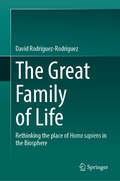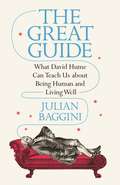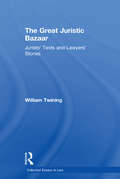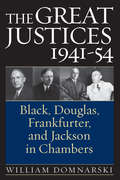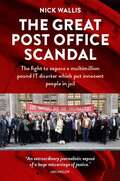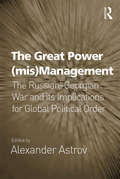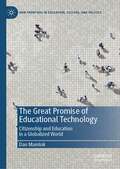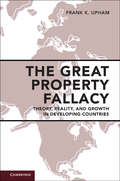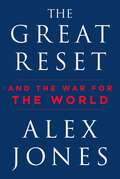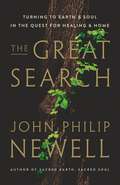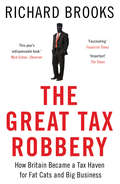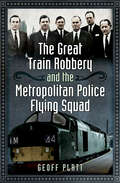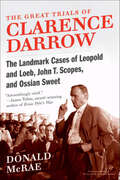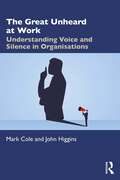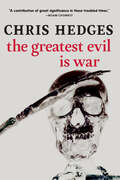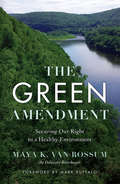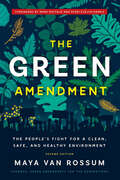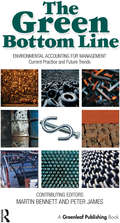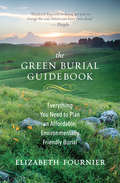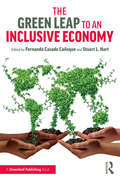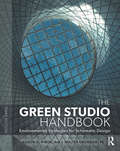- Table View
- List View
The Great Family of Life: Rethinking the place of Homo sapiens in the Biosphere
by David Rodríguez-RodríguezThis book explains the causes, consequences and desirable solutions to the unbalanced and unfair relationship between Homo sapiens and the other species that inhabit Planet Earth in a succinct, enjoyable and thought-provoking way. Major sociological, economic, political, educational, religious and phylosophical perspectives are reviewed in order to understand why we have reached the current alarming status of global biodiversity during the Anthropocene, and how we can react to it to attain not just human welfare, but global happiness. The target audience is wide, from the general public interested in the deep inner causes of environmental degradation, to college and university students and lecturers, notably in the fields of environmental ethics, environmental philosophy, environmental law and environmental politics.
The Great Guide: What David Hume Can Teach Us about Being Human and Living Well
by Julian BagginiInvaluable wisdom on living a good life from one of the Enlightenment's greatest philosophersDavid Hume (1711–1776) is perhaps best known for his ideas about cause and effect and his criticisms of religion, but he is rarely thought of as a philosopher with practical wisdom to offer. Yet Hume's philosophy is grounded in an honest assessment of nature—human nature in particular. The Great Guide is an engaging and eye-opening account of how Hume's thought should serve as the basis for a complete approach to life.In this enthralling book, Julian Baggini masterfully interweaves biography with intellectual history and philosophy to give us a complete vision of Hume's guide to life. He follows Hume on his life's journey, literally walking in the great philosopher's footsteps as Baggini takes readers to the places that inspired Hume the most, from his family estate near the Scottish border to Paris, where, as an older man, he was warmly embraced by French society. Baggini shows how Hume put his philosophy into practice in a life that blended reason and passion, study and leisure, and relaxation and enjoyment.The Great Guide includes 145 Humean maxims for living well, on topics ranging from the meaning of success and the value of travel to friendship, facing death, identity, and the importance of leisure. This book shows how life is far richer with Hume as your guide.
The Great Juristic Bazaar: Jurists' Texts and Lawyers' Stories (Collected Essays In Law Ser.)
by William TwiningSome law students find jurisprudence daunting, impersonal, dry and seemingly detached from practical affairs. William Twining believes that many jurists have been fascinating people struggling with questions that are both historically significant and relevant to contemporary issues. This book brings together previously published essays that centre on three related themes: reading Juristic texts, the role of narrative in law, and relations between theory and practice. Building on a pragmatic view of jurisprudence, the author explores different ways of reading and using Juristic texts, to set them in context, to bring them to life and to engage with the reader's own concerns. He applies this approach to throw fresh light on four familiar figures - Holmes, Bentham, Hart and Llewellyn. Challenging limited agendas and parochial points of view, Twining outlines a programme for a broad approach to legal theory in the context of globalization. He satirizes some bad habits in jurisprudence and explores in depth how stories can be seductive vehicles for cheating in legal contexts, yet are essential for making sense of disputes about fact or law.
The Great Justices 1941-54
by William DomnarskiDomnarski is a practicing intellectual property attorney in California and the author of a previous book on the history and nature of federal court judicial opinions. In this text, the author compares four brilliant and diverse jurists of the Roosevelt-era Court--Hugo Black, William O. Douglas, Felix Frankfurter, and Robert Jackson--during the period from 1941 to 1954. The study explores the Court's evolving civil rights jurisprudence that was born in the period during which the four justices served together, considers the Court as an institution and its relation to the American public, and analyzes how four individual justices sharing core jurisprudential beliefs and ambitions before appointment would later divide into competing liberal and conservative factions. Annotation ©2006 Book News, Inc. , Portland, OR (booknews. com)
The Great Leveler: Capitalism and Competition in the Court of Law
by Brett ChristophersBrett Christophers shows how laws help capitalism maintain a crucial balance between competition and monopoly. When monopolistic forces dominate, antitrust law discourages the growth of corporations and restores competitiveness. When competition becomes dominant, intellectual property law protects corporate assets and encourages investment.
The Great Philosophers:Kant (GREAT PHILOSOPHERS)
by Ralph Walker'Happiness is not an ideal of reason, but of imagination.' KantIn today's increasingly fractured world of oppression and uncertainty, Kant's moral philosophy is more important than ever before. And never has the need for moral absolutes been more pressing than in this age of doubt, disillusion and cynicism. This is where Kant comes in, as his moral philosophy continues to compel the attention of every serious thinker in the field. Clear, concise - and overwhelmingly convincing - Ralph Walker's stimulating, highly accessible guide spells out the power and renewed relevance of his thinking: a genuinely objective, absolute basis for a modern moral law.
The Great Post Office Scandal: The fight to expose a multimillion pound IT disaster which put innocent people in jail
by Nick WallisIn 1999 the British Post Office installed an unreliable computer system to track the financial transactions in its small post offices throughout England. Immediately the system began turning up large financial losses, indicating missing cash. The operators (sub-postmasters) and their employees were accused of theft. They were considered to be guilty and because they could not access the computer system which the government deemed to be perfect, they could not prove their innocence. Several were imprisoned, many lost their jobs and a couple of them committed suicide. Most suffered disgrace in their communities. They sometimes lost their homes and their finances were often in ruins. This book tells some of their stories and whether they were able to get redress. It describes in detail the operation of the British legal system and the behavior of numerous government officials. There is a BBC podcast called "The Great Post Office Trial" where you can hear some of the voices of the people presented in this book. It has 19 episodes.
The Great Power (mis)Management: The Russian–Georgian War and its Implications for Global Political Order
by Alexander AstrovDrawing on the empirical case of the Russian-Georgian war of 2008, the book explores the theoretical underpinnings of the idea of 'great power management' first articulated within the English School of International Relations. The contributors to the volume approach this idea from a variety of theoretical perspectives, ranging from policy-analysis to critical theory, but all of them are addressing the same question: What does the Russian-Georgian war of 2008 tell us about great power management as an institution of international society?
The Great Promise of Educational Technology: Citizenship and Education in a Globalized World (New Frontiers in Education, Culture, and Politics)
by Dan MamlokThis book critically looks at the tensions between the promise to transform education through the use of digital technology and the tendency to utilize digital technology in instrumental and technical ways. The widespread use of digital technology has had a remarkable effect on almost every domain of human life. This technological change has caused governments, educational departments, and non-governmental organizations (NGOs) to recognize the need to develop educational plans that would support the social and the cultural changes that have occurred with the ubiquitous permeation of digital technology into our everyday lives. This book challenges common assumptions regarding digital technology and education, through critical exploration of educational policies, interviews, and class observations in the US and Israel. In doing so, the author sheds light on the possibilities of advancing digital citizenship under current educational policies.
The Great Property Fallacy: Theory, Reality, and Growth in Developing Countries
by Frank K. UphamIn this groundbreaking book, Frank K . Upham uses empirical analysis and economic theory to demonstrate how myths surrounding property law have blinded us to our own past and led us to demand that developing countries implement policies that are mistaken and impossible. Starting in the 16th century with the English enclosures and ending with the World Bank's recent attempt to reform Cambodian land law - while moving through 19th century America, postwar Japan, and contemporary China - Upham dismantles the virtually unchallenged assertion that growth cannot occur without stable legal property rights, and shows how rapid growth can come only through the destruction of pre-existing property structures and their replacement by more productive ones. He argues persuasively for the replacement of Western myths and theoretical simplifications with nuanced approaches to growth and development that are sensitive to complexity and difference and responsive to the political and social factors essential to successful broad-based development.
The Great Reset: And the War for the World
by Alex JonesIn The Great Reset: And the War for the World, the most controversial man on earth Alex Jones gives you a full analysis of The Great Reset, the global elite's international conspiracy to enslave humanity and all life on the planet. If you really want to know what&’s happening in the world, this is the one book you must read now. Alex Jones is the most censored man on the planet and you should ask yourself why that is. There is a powerful authoritarian takeover in process that is seeking to capture the entire human system and turn it into an artificial factory farm controlled system. We are in a war for the future of the world. In this book, you will hear from the world&’s elites, from their own mouths, what they are planning for you and your families and you will learn what you can do to fight it.From central bankers, corporate billionaires, and corrupted government officials, global elites have been organizing a historic war on humanity under a trans-humanist, scientific dictatorship. Alex Jones was the first major figure to expose the World Economic Forum&’s agenda. He has dedicated the last 30 years of his life to studying The Great Reset, conducting tens of thousands of interviews with top-level scientists, politicians, and military officials in order to reverse engineer their secrets and help awaken humanity. The Great Reset: And the War for the World chronicles the history of the global elites' rise to power and reveals how they&’ve captured the governments of the world and financed The Great Reset to pave the way for The New World Order. Once dubbed a conspiracy theory, but now openly promoted by the most powerful corporations and governments, The Great Reset is a planned attempt to redistribute all the world&’s wealth and power into the hands of banks, corporations, billionaires, and The World Economic Forum. If you read one book in a lifetime, this is it. In The Great Reset: And the War for the World, you will discover from the self-appointed controllers of the planet in their own words, their plan for what they call the final revolution, or The Great Reset. The only way this corporate fascist conspiracy can succeed is if the people of the world are not aware of it. And this book lays out their sinister blueprint and how to stop it. While many great books have been written to help awaken people to this sinister agenda, no author has ever spent as much time and research on The Great Reset as Alex Jones. The Great Reset: And the War for the World is the undisputed trailblazer for understanding what&’s happening and how to stop it.
The Great Search: Turning to Earth and Soul in the Quest for Healing and Home
by John Philip Newell“If I could introduce you to ten amazing people whose influence could transform your life by energizing your spiritual quest, they would be the nine visionaries featured in The Great Search . . . plus a tenth, John Philip Newell himself. What a treasure this book is. Enthusiastically recommended!”—Brian D. McLaren, author of Life After DoomIn the great tradition of authors who leave church but remain spiritual—such as Barbara Brown Taylor, Rob Bell—the author of Sacred Earth, Sacred Soul forges a new path toward a true spiritual home, embracing a deep connection to the natural world.The story of Adam and Eve’s fall from innocence in the Garden of Eden is a mythical account of humanity’s broken relationship with the divine, with Earth, and with themselves.In contrast, Celtic wisdom is built on a strong bond with Earth. In the prophetic figures that Newell draws from, the Garden of Eden represents the inner garden of our souls and the outer garden of Earth, which are seen as essentially one. To live in relation to what is deepest in us is to live in relation to the ground from which we and all things have come. Where are we today, in relation to our true selves and the sacredness of Earth? And how are we to find our way home again?This life-affirming, nourishing book contemplates these questions at a moment of great spiritual awakening, an era characterized by religious exile on a vast scale. We need a new sense of home spiritually, deeply rooted within ourselves and in our shared journey with each other and Earth.
The Great Tax Robbery
by Richard BrooksInvestigative journalist and former tax-inspector Richard Brooks makes a mockery of government promises to "crack" the problem of tax avoidance. Discover why thousands of British state schools and NHS hospitals are owned by shell companies based in offshore tax havens; how "British" companies like Vodafone are designing their own tax laws; and how the taxman turns a blind eye to billions in illegally evaded tax in secret Swiss bank accounts. This ground-breaking exposé charts how the UK has become a global tax haven that serves the super wealthy, while everyone else picks up the bill. From offshore City bonus schemes to the exploitation of developing countries, Brooks unpicks the tangled mess of loopholes that well known multinationals, bankers, and celebrities use to legally circumvent British tax. Shocking and riveting, this is a bold manifesto for a tax system where we all contribute our fair share.
The Great Train Robbery and the Metropolitan Police Flying Squad
by Geoff PlattThe Squad that investigated The Great Train Robbery. "The Old Grey Fox" or "One Day Tommy" (Detective Chief Superintendent Tommy Butler) selected six of the best officers on the elite Metropolitan Police Flying Squad to investigate the Crime of the Century, but whilst many books have been written by and about every criminal arrested for this crime, NONE have been written about the detectives who traced and tracked them. Tommy Butler delayed his retirement to complete the job, but died a few months after he retired at 57 years of age, the only detective of his rank in the late 1950s and 1960s not to publish an autobiography.This book provides a detailed account of the men tasked with tracking down the most notorious thieves in British history. It examines the investigation in detail and asks how it would contrast with the methods used today should a similar incident take place.Geoff Platt examines what happened to these men after the investigation was closed and the effect it had on both their personal and professional lives.
The Great Trials of Clarence Darrow: The Landmark Cases of Leopold and Loeb, John T. Scopes, and Ossian Sweet
by Donald McRae“Wonderfully evocative… Donald McRae captures the Great Defender in all his complexity.... A joy to read.” — Kevin Boyle, National Book Award-winning author of Arc of Justice"Astonishingly vivid." —James Tobin, Award-winning author of Ernie Pyle’s WarThe story of the three dramatic trials that resurrected the life and career of America’s most colorful—and controversial—defense attorney: Clarence Darrow. Many books, plays, and movies have covered Darrow and the trials of Leopold and Loeb, John T. Scopes, and Ossian Sweet before: Geoffrey Cowan’s The People v. Clarence Darrow; Simon Baatz’s For the Thrill of It; Kevin Boyle’s Arc of Justice; Meyer Levin’s Compulsion and the film adaptation of the same name; Inherit the Wind; but few, if any, have achieved the intimacy and immediacy of Donald McRae’s The Great Trials of Clarence Darrow.
The Great Unheard at Work: Understanding Voice and Silence in Organisations
by John Higgins Mark ColeSilence always has something to say – it’s never neutral and speaks volumes if people are willing to hear. Our response to silence is often to dismiss or end it, to block it out with noise. Instead, silence needs to be taken seriously. This book explores the importance of understanding silence and shows how we can move from merely listening to truly hearing those around us. The interplay of voice and silence in organisational life is not straightforward. We can feel pressured to speak and compelled to keep our silence. Knowing how to read silence, to make sense of its generative and degenerative capacity, is a rarely developed skill among managers and leaders at all levels – who have been brought up to see silence as evidence of compliance or a weakness to be addressed. But it is a critical skill for managers and employees alike. Written by two experts in organisational development, this book explores different types of silence and their implications for organisational practice, digging into the theoretical roots and engaging with real stories and voices. It provides everyone at work with an understanding of the different meanings of silence and how to engage well with it. When to stay with it, when to join in with it, and when to be struck by what’s not being said and do something about it. The Great Unheard at Work is essential reading for corporate leaders, HR professionals in all sectors, business students, professionals, and anyone interested in leadership development.
The Greatest Evil is War
by Chris HedgesAn unflinching indictment of the horror and obscenity of war by one of our finest war correspondents.Drawn from experience and interviews by Pulitzer-prize-winner Chris Hedges, this book looks at the hidden costs of war, what it does to individuals, families, communities and nations.In fifteen short chapters, Chris Hedges astonishes us with his clear and cogent argument against war, not on philosophical grounds or through moral arguments, but in an irrefutable stream of personal encounters with the victims of war, from veterans and parents to gravely wounded American serviceman who served in the Iraq War, to survivors of the Holocaust, to soldiers in the Falklands War, among others. Hedges reported from Sarajevo, and was in the Balkans to witness the collapse of the Soviet Union. In 2002 he published War Is a Force that Gives Us Meaning, which the Los Angeles Times described as &“the best kind of war journalism… bitterly poetic and ruthlessly philosophical&” and the New York Times called &“a brilliant, thoughtful, timely, and unsettling book.&” In the twenty years since, Hedges has not wanted to write another book on the subject of war—until now, with the outbreak of war in Ukraine. It is important again to be reminded who are the victors of the spoils of war and of other unerring truths, not only in this war but in all modern wars, where civilians are always the main victims, and the tools and methods of war are capable of so much destruction it boggles the mind. This book is an unflinching indictment of the horror and obscenity of war by one of our finest war correspondents.
The Green Amendment: Securing Our Right to a Healthy Environment
by Rossum Maya VanThe Constitutional Change We Need to Protect Our Priceless Natural ResourcesFor decades, activists have relied on federal and state legislation to fight for a cleaner environment. And for decades, they've been fighting a losing battle. The sad truth is, our laws are designed to accommodate pollution rather than prevent it. It's no wonder people feel powerless when it comes to preserving the quality of their water, air, public parks, and special natural spaces.But there is a solution, argues veteran environmentalist Maya K. van Rossum: bypass the laws and turn to the ultimate authority—our state and federal constitutions.In 2013, van Rossum and her team won a watershed legal victory that not only protected Pennsylvania communities from ruthless frackers but affirmed the constitutional right of people in the state to a clean and healthy environment. Following this victory, van Rossum inaugurated the Green Amendment movement, dedicated to empowering every American community to mobilize for constitutional change.Now, with The Green Amendment, van Rossum lays out an inspiring new agenda for environmental advocacy, one that will finally empower people, level the playing field, and provide real hope for communities everywhere. Readers will discover:• how legislative environmentalism has failed communities across America,• the transformational difference environmental constitutionalism can make,• the economic imperative of environmental constitutionalism, and• how to take action in their communities.We all have the right to pure water, clean air, and a healthy environment. It's time to claim that right—for our own sake and that of future generations.
The Green Amendment: The People's Fight for a Clean, Safe, and Healthy Environment
by Maya K. van RossumA veteran environmentalist shares her roadmap to a healthier world—one that uses the law to empower activists and provide hope for communities everywhere.We have reached a critical tipping point in our fight for the environment: Corporations profit off climate change, natural disasters devastate homes, and the most vulnerable suffer the health effects of pollution. Yet our laws are designed to accommodate this destruction rather than prevent it. Without government support, it's no wonder people feel powerless.But there is a solution. In The Green Amendment, veteran environmentalist Maya K. van Rossum presents her radically simple plan for a green future: bypass local laws and turn to the ultimate authority—our state and federal constitutions—to ensure we have the right to a healthy environment.Through compelling interviews with activists on the ground, clear evidence from experts, and heartbreaking stories from those hit hardest by environmental ruin, The Green Amendment lights the path forward. In this updated edition of her trailblazing 2017 book, van Rossum invites readers to join the movement by sharing:Why Green Amendments work where other movements have failedHow to position Green Amendments and what specific language offers the strongest legal protectionsHow to argue in favor of environmental rights, and the economic and health benefits that will help activists make the caseHow Green Amendments address the crucial intersection of environmentalism and anti-racismWhat everyone—from artists and students to scientists and lawyer—can do to further the causeWith the power of The Green Amendment, we can claim our environmental rights, ensuring a clean, safe Earth for generations to come.
The Green Bottom Line: Environmental Accounting for Management: Current Practice and Future Trends
by Peter James Martin BennettTo date, both internal and external corporate environmental reporting and management systems have focused on physical input–output measures. However, external stakeholders are increasingly demanding that organisations provide more financial information about the costs and benefits of their environmental actions. As environmental costs rise, internal decision-makers are also seeking such information to ensure that money is well spent. Beyond basic compliance, many companies will not countenance environmental actions for which a "business case" cannot be made. A number of companies – such as Baxter, BT, Xerox, Zeneca and others – are now beginning to develop a better understanding of the costs and benefits of environmental action. The US Environmental Protection Agency has also done considerable work on models designed to understand the "full costs" of pollution control investments, with the aim of demonstrating that – when these are properly considered – pollution prevention can be a more cost-effective alternative. The Green Bottom Line brings together much of the world's leading research and best-practice case studies on the topic. Divided into four sections, covering "General Concepts", "Empirical Studies", "Case Studies" and "Implementation", the book includes case studies from the US EPA's Environment Accounting Programme and contributions from authors at institutions including the IMD, INSEAD, Tellus Institute and the World Resources Institute. It constitutes a state-of-the-art collection.
The Green Burial Guidebook: Everything You Need to Plan an Affordable, Environmentally Friendly Burial
by Elizabeth FournierFuneral expenses in the United States average more than $10,000. And every year conventional funerals bury millions of tons of wood, concrete, and metals, as well as millions of gallons of carcinogenic embalming fluid. There is a better way, and Elizabeth Fournier, affectionately dubbed the &“Green Reaper,&” walks you through it, step-by-step. She provides comprehensive and compassionate guidance, covering everything from green burial planning and home funeral basics to legal guidelines and outside-the-box options, such as burials at sea. Fournier points the way to green burial practices that consider both the environmental well-being of the planet and the economic well-being of loved ones.
The Green Leap to an Inclusive Economy
by Stuart L. Hart Fernando Casado CanequeIn The Green Leap to an Inclusive Economy, two leading thinkers, Stuart L. Hart and Fernando Casado Cañeque, challenge head on the two biggest issues facing humanity and the planet today: Inequality and Environmental Degradation. They present the new design thinking required for a more inclusive and sustainable economy which respects both people and planet. Far from simply presenting the problems, this book offers insightful case studies that showcase the challenges and opportunities of base of the pyramid venturing in different geographical and cultural contexts, as well as providing a detailed description of the tools that have been proven to enhance the innovation of business models to address the issues. Through telling these stories, the authors provide a roadmap for how to make an inclusive and sustainable economy a reality, where opportunity and prosperity are available to more of the people that participate in the economy as workers, consumers, owners and the wider community, whilst addressing the risks to the natural capital we all depend on. This book is essential reading for anyone looking to accelerate the development of an inclusive business for the benefit of society and the planet, as well as those involved in the study and research of the base of the pyramid and sustainable business solutions.
The Green Studio Handbook: Environmental Strategies for Schematic Design
by Alison G Kwok Walter GrondzikThe Green Studio Handbook remains an essential resource for design studios and professional practice. This extensive and user-friendly tool presents practical guidelines for the application of green strategies during the schematic design of buildings. Students and professionals can quickly get up to speed on system viability and sizing. Each of forty-three environmental strategies includes a brief description of principles and concepts, step-by-step guidance for integrating the strategy during the early stages of design, annotated tables and charts to assist with preliminary sizing, key issues to consider when implementing the strategy, and pointers to further resources. Ten new in-depth case studies illustrate diverse and successful green buildings integrated design projects and how the whole process comes together This third edition features updated tables and charts that will help to save energy, water, and material resources during the early stages of design. More than 500 sketches and full-color images illustrate how to successfully apply strategies. A glossary, a project index listing 105 buildings in 20 countries, updated tables and drawings, and I-P and SI units increase the usefulness of The Green Studio Handbook.
The Green Studio Handbook: Strategies for Decarbonization
by Walter T. Grondzik Alison G. Kwok Tom HahnMaking the complexities of green architecture accessible to the design studio, The Green Studio Handbook remains a must-read for current and future architects. The heart of this book provides 43 comprehensive design strategies covering the building envelope, lighting, heating, cooling, energy and electricity, and water and waste – each with a description, key architectural issues, implementation considerations, and a step-by-step design procedure for integration early in the design process. Each design strategy has been thoroughly reviewed and updated to reflect the latest evidence-based guidance, best practices, and standards in consideration of all climatic zones.In addition to more than 80 building examples provided throughout, ten in-depth case studies illustrate successful integration of numerous strategies.All case studies are brand-new to this fourth edition and include a wide range of building types, from the USA, Colombia, Rwanda, Malaysia, Denmark, Bhutan, Canada, and Australia.Envelope design strategies have been significantly revised and expanded to include new strategies on: Foundation systems for the reduction of embodied carbon Framing systems using mass-timber, bamboo, and other natural material-based systems Low-complexity wall systems using "natural" elements such as earth, lime, straw, and hemp High-complexity wall systems for enhanced thermal performance and strength Additional roofing systems beyond green roofs
The Greenbook: Texas Rules Of Form
by Texas Law ReviewThe Greenbook is not a complete citation guide unto itself. Basic rules of form are found in the Harvard Law Review Association's The Bluebook: A Uniform System of Citation (19th ed. 2010). Except as modified herein, the rules in The Bluebook should be followed. The Greenbook is intended primarily as a supplement to The Bluebook to address citation problems unique to Texas; in cases of conflict, The Greenbook preempts The Bluebook in citations to Texas authorities. In any event, if unusual circumstances make the suggested citation form inadequate, devise a reasonable alternative. Likewise, for specific sources not addressed by citation manuals, analogize to the suggested citation form for similar sources
